Trump Lawyer Dangled Pardon to Flynn and Manafort
John Dowd allegedly raised the possibility while the Mueller investigation was closing in on the two presidential advisors.
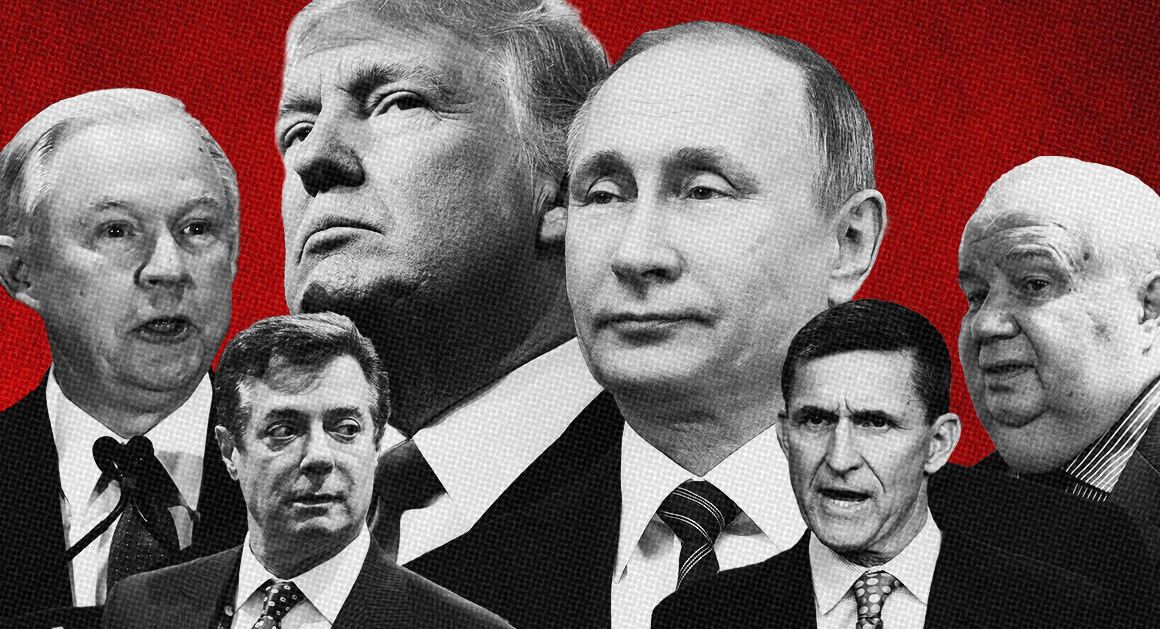
NYT (“Trump’s Lawyer Raised Prospect of Pardons for Flynn and Manafort as Special Counsel Closed In“):
A lawyer for President Trump broached the idea of Mr. Trump pardoning two of his former top advisers, Michael T. Flynn and Paul Manafort, with their lawyers last year, according to three people with knowledge of the discussions.
The discussions came as the special counsel was building cases against both men, and they raise questions about whether the lawyer, John Dowd, was offering pardons to influence their decisions about whether to plead guilty and cooperate in the investigation.
The talks suggest that Mr. Trump’s lawyers were concerned about what Mr. Flynn and Mr. Manafort might reveal were they to cut a deal with the special counsel, Robert S. Mueller III, in exchange for leniency. Mr. Mueller’s team could investigate the prospect that Mr. Dowd made pardon offers to thwart the inquiry, although legal experts are divided about whether such offers might constitute obstruction of justice.
Mr. Dowd’s conversation with Mr. Flynn’s lawyer, Robert K. Kelner, occurred sometime after Mr. Dowd took over last summer as the president’s personal lawyer, at a time when a grand jury was hearing evidence against Mr. Flynn on a range of potential crimes. Mr. Flynn, who served as Mr. Trump’s first national security adviser, agreed in late November to cooperate with the special counsel’s investigation. He pleaded guilty in December to lying to the F.B.I. about his conversations with the Russian ambassador and received favorable sentencing terms.
Mr. Dowd has said privately that he did not know why Mr. Flynn had accepted a plea, according to one of the people. He said he had told Mr. Kelner that the president had long believed that the case against Mr. Flynn was flimsy and was prepared to pardon him, the person said.
The pardon discussion with Mr. Manafort’s attorney, Reginald J. Brown, came before his client was indicted in October on charges of money laundering and other financial crimes. Mr. Manafort, the former chairman of Mr. Trump’s presidential campaign, has pleaded not guilty and has told others he is not interested in a pardon because he believes he has done nothing wrong and the government overstepped its authority. Mr. Brown is no longer his lawyer.
It is unclear whether Mr. Dowd, who resigned last week as the head of the president’s legal team, discussed the pardons with Mr. Trump before bringing them up with the other lawyers.
While Mueller and company will undoubtedly investigate this matter, it’s not obvious without a whole lot more information that this would constitute obstruction. First, while one presumes Dowd wouldn’t offer a pardon without discussing it with his client, he might well have “broached” the matter without doing so. Second, even if Trump suggested that Dowd reach out and offer up a pardon, it very much matters what the quid pro quo was. Unless he was promising to pardon them if they were found to have committed perjury, there’s no obvious problem.
Moreover, depending on the nature of the arrangement, a pardon might well help more than it hurts, since it would remove 5th Amendment protections. Keith Harper writing last July:
Most likely the President has been informed of one important fact about his pardon power, anyone he pardons is no longer under criminal jeopardy for federal crimes and, accordingly, Fifth Amendment protection for self-incrimination evaporates. Manafort, Page, Kushner, and Flynn at this point – pre-pardon – need not answer any questions from Robert Mueller, Congress or anybody. The Fifth Amendment of the United States Constitution provides no person “shall be compelled in any criminal case to be a witness against himself.”
Once pardoned, however, there is no legal jeopardy for past federal crimes. Therefore, the Fifth Amendment can no longer be a shield and permit Trump’s pardoned associates from refusing to answer questions under penalty of perjury. This creates a paradox for President Trump. When he pardons an individual, they are free from possible prosecution but they are also uncloaked of their most robust constitutional protection.
This may well be why President Trump has not pardoned Flynn, for example. Given the reported substantial contacts between Flynn and Russian government emissaries, given Flynn’s patent falsities including on federal forms completed under penalty of perjury, Flynn’s only protection presently from being compelled to testify – including possibly against the President and others – is the Fifth Amendment self-incrimination clause. Imagine if that was no longer a shield. Grand Jury, FBI Agents, Congress all could drill Flynn under oath. Any material prevarication would be punishable as perjury. At that point Flynn’s personal interest will be to tell the truth, even if that truth incriminates the President who fired him.
So the pardon of presidential associates is a double-edged sword. On the one hand, he will ensure they are not prosecuted if they committed crimes in furtherance of the President’s interest. On the other, once pardoned, the interest of the pardoned associates likely diverges from the President. If crimes were committed that implicate the President and his family – and I do not believe we have sufficient evidence to answer that conclusively at this time – prior to being pardoned, a Trump associate is 100% within their rights to simply say nothing. But not afterwards.
So, again, unless there was a promise to pardon them if they lied to protect Trump and got caught doing so, it’s not obvious what the advantage would be.
UPDATE: It should be noted that Dowd and several other Trump-associated lawyers adamantly deny the story:
Mr. Dowd, who was hired last year to defend the president during the Mueller inquiry, took the lead in dealing directly with Mr. Flynn’s and Mr. Manafort’s lawyers, according to two people familiar with how the legal team operated.
He denied on Wednesday that he discussed pardons with lawyers for the president’s former advisers.
“There were no discussions. Period,” Mr. Dowd said. “As far as I know, no discussions.”
Contacted repeatedly over several weeks, the president’s lawyers representing him in the special counsel’s investigation maintained that they knew of no discussions of possible pardons.
“Never during the course of my representation of the president have I had any discussions of pardons of any individual involved in this inquiry,” Jay Sekulow, a lawyer for Mr. Trump, said on Wednesday.
Ty Cobb, the White House lawyer dealing with the investigation, added, “I have only been asked about pardons by the press and have routinely responded on the record that no pardons are under discussion or under consideration at the White House.”
Mr. Kelner and Mr. Brown declined to comment.
As HarvardLaw92 notes in the discussion thread, such an offer could be grounds for disbarment.
UPDATE 2 (0624 March 29): Former Federal prosecutor and current Harvard Law professor Alex Whiting explains “Why Dangling a Pardon Could Be an Obstruction of Justice—Even if the Pardon Power is Absolute.”
Some experts have argued that the pardon power is absolute and that the President’s motives in issuing a pardon thus could not be questioned, while others contend that it could be a crime to issue a pardon for corrupt purposes (such as in exchange for cash). But the debate over the absolute nature of the pardon power is actually not relevant to the alleged incidents involving Trump’s lawyer. Indeed, that entire debate can be set aside for the moment. Why? Because there’s been no pardon. Instead, a pardon has only been dangled before Flynn and Manafort, and the analysis of whether that action could become part of an obstruction case against Trump raises entirely different considerations.
If Trump actually pardoned Flynn and Manafort, he would have to do so publicly and accept the political consequences of this profound act. As Jack Goldsmith suggests in the New York Times story, for those who believe that the pardon power is absolute and cannot be scrutinized by courts, the remedy for a corrupt pardon is in the political arena: elections or impeachment. What’s more, if Trump actually pardoned Flynn and Manafort, then the two men could no longer assert their Fifth Amendment privilege against self-incrimination because their pardons would erase their federal criminal liability, and therefore Mueller could call both to testify in the Grand Jury and in any subsequent trial. If they continued to assert their Fifth Amendment privilege on the basis of state criminal exposure, Mueller could obtain an order granting them so-called “use immunity” which would ensure that their testimony could not be used against them in any way in state court either. Manafort and Flynn would then be compelled to testify, or risk jail for contempt of court.
The pardon dangle works completely differently—and in important respects has the opposite effects. First, this kind of dangle is not a public act. Therefore, as long as it remained secret, it could be done without incurring any of the political downstream consequences that come with actually pardoning someone. It hides the President from scrutiny rather than exposes him to it as a potential check on the use of the power. Second, the objective of the dangle appears to have been to foreclose the prospect of Flynn and Manfort’s cooperating or testifying. Once again, this is the opposite effect of an actual exercise of the pardon. The message of the dangle was sufficiently clear: hang in there and keep fighting (do not cut a deal with the special counsel) because you will be pardoned before you spend a day in jail. The President and his lawyer’s hope would have been that with the threat of jail eliminated, neither former aid would feel compelled to plead guilty and cooperate with Mueller to reduce his sentence. But, since they were not actually pardoned or not yet anyway, they still kept their Fifth Amendment privileges, and so Mueller could not simply demand they testify before the Grand Jury. In this way, the dangle could operate to stop any cooperation from Flynn and Manafort, who could then be pardoned later if and when they were indicted or even after their cases went through pretrial, trial and appeal. Indeed, you also have to put yourself back at the time these events all took place: before Manafort was indicted and Flynn pleaded guilty. That’s when the dangle could work its magic.
Because a pardon dangle is secret and seeks to discourage cooperation with an ongoing investigation without public scrutiny or consequences, it should be analyzed differently than a pardon when it comes to an obstruction case. Because of the way a pardon dangle operates, it should acquire none of the deference that might be afforded an actual pardon, and if the dangle is found to be orchestrated with a corrupt motive, it should qualify as a potential act of obstruction of justice.
Dowd now vociferously denies that there was any dangle at all, but if one occurred it will be fairly easy to prove. Dowd also has every reason to try to deny it. Not only does it look bad in the court of public opinion. It is bad in the court of law. The fact that Dowd made the offer—as Trump’s personal lawyer—means presumptively this was also no official act. As Marty Lederman has noted, Dowd himself may be prosecutable for involvement in what amounts to criminal activity here. At bottom, a key to understanding this issue is not to be distracted by debates about the scope or absolute nature of the pardon power. The dangling pardon is a different creature, necessitating a very different analytic inquiry.
Whiting cites no precedent, though, which I take to mean that this is merely a theory he’s advancing rather than a tactic that’s been successful in the past. It’s indeed an interesting theory. Still, most state governors have a pardon power and many of them have been run out of office and even jailed for various forms of corruption over the years so I’d be shocked, indeed, if none of them have ever dangled a pardon.

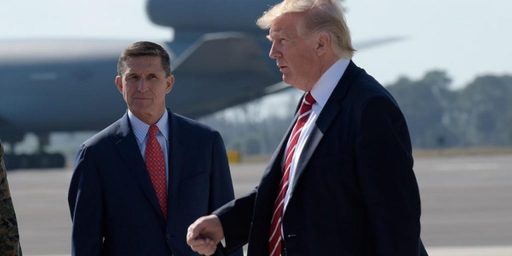
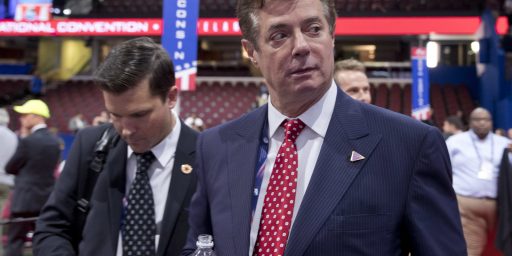

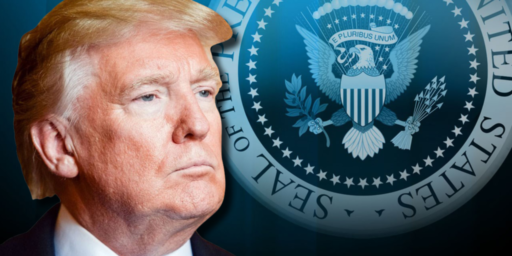
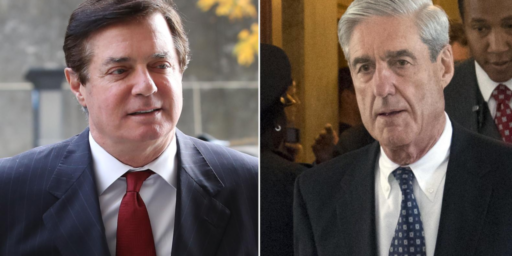
I couldn’t disagree more. If Trump knew about this, it is grounds for impeachment. My god James, the President would be using his pardon power to obstruct an investigation into his collusion with an enemy nation. The congress should take this as an admission of guilt.
As for your statement “it very much matters what the quid pro quo was”, the only reason it would even come up is to obstruct the investigation. The idea of presupposing Trump’s good faith is ridiculous. At this point, he needs to proactively offer proof he has not colluded, not that he be “innocent until proven guilty”*. But of course it is extremely unlikely that any such proof can exist.
*Of course he is innocent until proven guilty in a criminal case. But impeachment is about whether he can be trusted with the highest office in the land.
I bet Trump still thinks he can Pardon himself
@MarkedMan:
Impeachment, ultimately, is a political choice. Theoretically, a hostile Congress could impeach him on all manner of grounds. Politically, however, unseating a duly elected President is a huge step. There’s going to be and ought to be a very high bar.
I think there are grounds now on Emoluments Clause and related corruption charges. Pretty much from Day 1, there have been egregious violations that would have been a daily scandal for any other President and get virtually ignored for this one.
I also think there’s reason to think he’s interfered with the Russia investigation. It’s not clear that this particular report does much to bolster that.
@James Joyner:
Removing a president ought to be a very high bar. removing Trump, no matter how duly elected, shouldn’t be.
@MarkedMan:
I’m pretty sure Putin has recordings of all the meetings and even more certain that trump knows he does.
Regardless of Trump’s involvement, this matter approaches constituting cause for disbarment with respect to Dowd.
@HarvardLaw92: I was wondering about Dowd’s exposure. Thanx.
@HarvardLaw92: @OzarkHillbilly: FWIW, Dowd adamately denies the story.
@James Joyner: Sooner or later he will adamantly deny ever representing trump.
@James Joyner:
He had better hope that there wasn’t more than one person in the room at the time who remembers the conversation differently or has media substantiating it.
Assuming he actually did this, he’s an abject moron for broaching the subject – at all, to be frank, but at the least for doing it directly instead of through an deniable intermediary. Unfortunately we can’t really disbar people for being stupid – although if wishing could make it so …
What is the batting average for “anonymous sources” when it comes to anti-Trump stories? I ask because this story smells like BS simply because the people feeding it to the NYT seemed to have had no idea they were potentially putting Dowd in much greater jeopardy than Trump. If this was something that could get him disbarred, how the hell isn’t that mentioned in the story itself?
Mike
@James Joyner: Pretty much from Day 1, there have been egregious violations that would have been a daily scandal for any other President and get virtually ignored for this one.
Should George W. Bush have been impeached for authorizing torture of prisoners and spying on Americans without warrants?
Mike
@MBunge:
So you’re now arguing that Trump is no better than Bush was? Interesting …
@MBunge:
What in the world ever gave you the idea that Manafort and Flynn’s attorneys give the slightest little bit of a damn whether or not they’d be putting John Dowd into jeopardy?
Meanwhile…
Trump campaign aide Rick Gates was knowingly talking with a Russian spy in fall 2016, Mueller filing suggests
Let’s look at this part again:
This is a broad, bright line directly from Russian intel to the Trump campaign, and Mueller has flipped the Trump campaign official who was dealing with them. Trump apologists will say the Russian intel guy was “former” GRU, but there’s no such thing, really. And on top of all that…the Russian intel guy was an associate of none other than Paul Manafort.
@MBunge: “Butwhatabout Butwhatabout Butwhatabout Butwhatabout?????” Please, spare us. If all you have is “my guy is just as shitty as this previous guy of the same political party,” you’ve already lost.
@MBunge:
Actually, it’s pretty good…and way better than your batting average for defending your orange man-crush.
If this is a the worst “witch-hunt” ever…then what is Dennison so concerned about that he is dangling pardons?
As Mikey points out…we know there is a direct line from Gates to the GRU.
We know there is a direct line from Stone to the GRU.
And we don’t know what Mueller knows. But you know Dennison does. Hence the dangling pardons.
@MBunge:
Right there is a perfect example of MBunge’s level of cluelessness about what forum it is he’s on.
The righties here routinely engage in whataboutism in reaction to criticisms of Trump. But the whatabouts are always directed at Democrats–Clinton and Obama in particular. MBunge is in the unique position of not even realizing he’s on a blog where almost everyone thinks Bush was awful.
@MBunge: Also:
You support Trump, a President who just appointed one of G. W. Bush’s most prominent foreign policy advisers, who was also one of Bush’s UN Ambassadors, as his National Security Adviser.
For as slimy and how sloppy the Orange Mange is, he certainly does have a level of Teflon no other modern president has had…can you imagine if any of this swirled around Obama? He would have already been impeached and everyone on the right would be howling every single day that he should be removed from office…
You know, when you see a defense of Trump in comment sections like this or on message boards, sometimes it’s hard to say whether it’s a real defense by a Trump supporter, or a parody of a defense by someone who dislikes Trump.
@Kathy: In other words, Poe’s Law.
https://en.wikipedia.org/wiki/Poe%27s_law
@Kylopod:
Kind of. In this case, Trump’s faithful cultists come across as parody.
@Daryl’s other brother Darryl:
You are darn right it’s good. Just to hit the highlights: During the campaign, it was reported that the Trump campaign had ties to the Russians. “Fake News”, Trump said, “it’s all lies. No one on my campaign ever had contact with the Russians. I’ve never had contact with the Russians.” Then the rumors got specific: Paul Manafort had ties to the Russians. “Fake News” cried Trump. Then Flynn. “Fake News!” Gates. “Fake News!” Donald Trump Jr and Jared. “Fake News”. Papadopolos. Oh the heck with it. On and on and on. And as each person gets caught, with most actually charged and pleading guilty, Trump whites his denials from the slate, says, OK, maybe that guy, but it was really nothing and no more. Which lasts until the next guy gets caught.
A lot of Trump’s supporters are just obnoxious a-holes that are just going to deny everything because they know it annoys, well, people who care about the truth. But a not insubstantial number of his supporters are unable to process actual reality and are able to wipe their own mental slate clean at each event, and start over from the new place.
@Kathy: I’ve been using the term for quite a while, and it surprised me a little when I found out it was first invented as recently as 2005. I assumed it was one of those terms going back to the hoary days of Usenet, which was the source of a lot of the familiar Internet cultural lingo, including trolling, flamewar, and Godwin’s law. Poe’s law seems to fit right in there, and it’s almost hard to believe nobody on the old newsgroups ever thought of such a term.
Over at Jonathan Bernstein’s blog there’s a commenter who calls himself “Angry White Patriot” and spews far-right, jingoistic blather. I’m fairly convinced it’s a parody account. What’s amusing is that he regularly receives upvotes from actual righties (on Disqus you can see who has given upvotes to each comment). It’s almost Borat-like.
Then again, you never know. And I do have a history of assuming these things perhaps too hastily. Trump himself is a perfect example. For years I was absolutely convinced he was some kind of performance artist doing a shtick, like Andy Kaufman pretending to be Tony Clifton. I’m talking about before he even entered politics. Back in the early 2000s when he was getting in those public feuds with Rosie O’Donnell, I had the sneaking hunch it was all a publicity stunt, that they were both in it together, and that they were actually going out for coffee afterwards and laughing about it.
It was only by 2016 that I started to rethink my assumptions. It simply never occurred to me that there could be any human being as overtly ridiculous as Donald Trump. When people call him a narcissist and a liar, in a sense I feel like they’re missing the point. The world is filled with narcissists and liars. Trump is a walking cartoon character. If he’d never existed and you made a movie depicting someone like him, it would be savaged by critics as a dumb kiddie-level flick with a cardboard villain. (Of course it wouldn’t actually be appropriate for kids if you went into sufficient detail about his, um, personal proclivities.) He isn’t even interesting apart from the fact that by all the laws of common sense nobody like him should exist in the real world. Even actual fictional satiric figures (Howard Beale, Senator Bulworth) are in some ways a lot less ludicrous than Trump. In other words, he isn’t even good satire.
@MBunge:
While I have yet to see a more methodical study (ala something in the CJR), in general, they have been pretty accurate — with the exception of getting the timelines wrong. In fact, I’m pretty sure we can go back and find you smugly saying the exact same thing about reports of people like McMaster and Tillerson being “on the way out” and pointing out that both men were still in their positions (as of your writing).
Funny, in fact that, you never seem to acknowledge all those times where the reports were more or less accurate (other than getting the timeline wrong).
I wonder why that is?
@mattb:
Trumpaloons are not allowed to have memories. Every new day is a blank state. The fact that Trump says categorically that he will not fire X and a week later fires X – exactly as the news reports said he would – is scrubbed from @Bung’s memory. The eternal sunshine of the brain-dead mind.
@Kylopod:
Years ago I came to the realization that if a performer played a part long enough, they would become that part. I was specifically referring to Howard Stern. In the 80’s he would occasionally break character on his morning shock jock radio show, and talk about how at the end of the segment he would get into a car and be driven back to his suburban family in Long Island where he would talk about his kid’s grades with his wife. I would argue with my brother, who was a huge fan, that Stern couldn’t keep playing the character without becoming it. In that case I was proved right. Howard Stern dumped his wife and family and became a parody of himself. Similarly, you might have been right at one point, and Trump might have been simply playing a character. But eventually the character subsumed him. At this point I don’t think he can tell the difference between reality and Trump-world anymore.
@MarkedMan: Your points about Stern reminded me of the underrated movie Talk Radio, about a fictional radio host based primarily on Alan Berg, the shock jock who was murdered by neo-Nazis in the ’80s. The Berg figure in the film is depicted as being just as disturbed as his on-air persona, a tortured and troubled young man who takes it out on his audience. He isn’t really pretending; he’s showing his true self. I suppose it’s a fine line, as anybody in front of a camera or microphone is going to be performing to some degree, and in formats like radio (as well as standup comedy, I think, if to a lesser degree) there’s a tendency to become a sort of “id,” letting everything loose. You become an exaggerated version of yourself.
Roger Ebert, in his review of the film, mentioned that he knew Berg, having gone on his program a few times and talked to him on at least one other occasion. Ebert’s impression was that Berg (a recovered alcoholic who was several decades older than his movie counterpart when he was killed) was simply a guy doing a shtick. As he put it, “When I learned that he had been murdered, my first reaction was disbelief that anyone could have taken him that seriously. Jeez, didn’t they know he was just another poor guy trying to earn a living?”
I also enjoyed the movie Private Parts, about the life of Howard Stern. I have heard people say it is a whitewash of Stern, and given Stern’s personal involvement in the film, that makes sense. But it does convey how being a shock jock is sort of like being a junkie getting a fix. There’s always the pressure to go further than you ever did before, to plumb new depths of depravity, because the audience always eventually becomes deadened to all your previous antics.
I was well aware of this all those years watching Trump as a public figure. Even then, I still wildly misread him. I did actually think of him sort of as “just another poor guy trying to earn a living” (or, rather, another rich dude trying to stay relevant). There’s definitely evidence that he’s worsened with age, but there are also clues it was never simply a performance. According to Jon Meacham’s 2015 biography of George H.W. Bush, in 1988 Trump actually approached Lee Atwater and requested that he be placed into consideration to become Bush’s running mate. (Bush reportedly found the request “strange and unbelievable.”) What’s notable about this anecdote is that it happened behind closed doors. It couldn’t have been a publicity stunt, since it wasn’t public at all.
When Trump uttered his oft-quoted remark that he could shoot someone on 5th Avenue and wouldn’t lose any support, I think this fooled a lot of people because it sounded surprisingly self-aware, even a bit meta. But you have to look at it from his twisted point of view. He wasn’t confessing a shameful truth, because he literally sees nothing shameful at all about being a cult of personality with a mob of mindless adoring fans. He lies about practically everything, but he doesn’t feel the need to hide the depths of his own cynicism, because he’s actually proud of it. To some extent, I think that’s been true about him for as long as he’s been in the public eye.
Re: Updated #2. Criminality aside, I suspect dangling a pardon would be an ineffective tactic for Trump. Given that, once pardoned, the beneficiary could be compelled to testify against Trump, what moderately intelligent person would believe that Trump would follow through? Trump publicly treats everyone around him like garbage. Why would they be any different?
@Kylopod:
I never paid much attention to Trump before 2015. There was no reason to. Oh, he was mentioned here and there, but until then he was nothing.
He is still nothing, where it counts, but now he can screw over the world when he throws a fit.
@Kathy:
Neither did I. (Well, never before 2011 in my case.) He was just some weird celebrity businessman. I’ve never seen The Apprentice. It’s one of the reasons why I misread him; he occupied my peripheral vision at best. But like news about the love lives of Hollywood stars, it’s something you couldn’t totally escape from hearing at least a little about, despite your best efforts. I was always annoyed whenever the headlines about the latest Trump/Rosie feud flashed on screen, and I never clicked on them to find out the details. My belief that Trump was a performance artist wasn’t some carefully considered theory, it was just a casual assumption I made without putting much thought into it at all. That’s the way we all hold onto our prejudices. Everything I thought I knew about human nature told me it was impossible for anyone to behave the way Trump does in earnest, and that when celebrities acted like walking cartoon characters it was just part of the brand they were selling. I’ve been forced to rethink this assumption not just about Trump, but about celebs in general.
@Kylopod:
I had no theory of Trump because I didn’t spare him any thought. Through the primaries I kept expecting him to crash and burn. the fact that he didn’t says more about the failings of his supporters than about him.